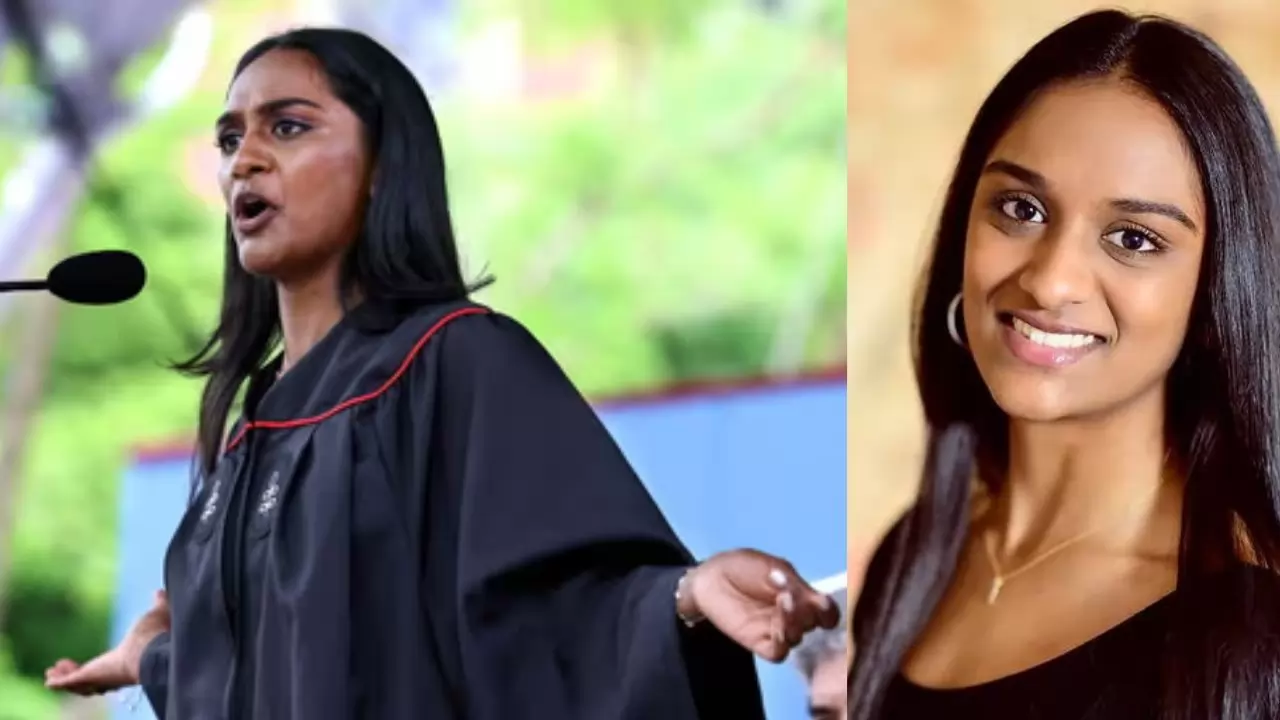
X
During her graduating speech on campus, Harvard student Shruthi Kumar, who is of Indian descent, took aim at her alma mater, Harvard University. Not only did Shruthi stand up for the rights of her thirteen classmates who were denied graduation due to their pro-Palestine demonstrations, but she is also the first person in her family to attend an American university. She has described how her parents did not know how the American university admissions process worked, so she had to learn it on her own.
Born into a family of South Asian immigrants, Shruthi grew up surrounded by cornfields and cattle ranches on Nebraska's Great Plains. Faculty members and fellow Harvard students encouraged Shruthi to give her speech. Following her address, almost a thousand students participated in a walkout in support of the 13 students whose graduation from Harvard University was halted due to their demonstrations against the war in Gaza. Raised on Nebraska's Great Plains, close to cornfields and cattle ranches, Shruthi is the eldest daughter of South Asian immigrants.Faculty members and other classmates at Harvard encouraged Shruthi to give her speech. Following her address, over 1,000 students organized a walkout in support of the 13 students whose graduation from Harvard University was suspended because of their anti-Gaza protests.
Shruthi garnered support beyond her university for her courageous and bold actions. Known for being vocal about her experiences as a student and as an individual of Indian origin, she has often shared her journey candidly.In an article for Harvard Magazine, she explored the power of navigating life without a predetermined path. She recounted how her parents were unfamiliar with the process of applying to US colleges, as they had never attended one themselves."I grew up in the Great Plains of Nebraska, surrounded by cattle ranches and cornfields. As the eldest daughter of South Asian immigrants, I was the first in my family to attend college in the US," Shruthi wrote.
Her life has been a journey of figuring things out and embracing the unknown. She reflected, "From Nebraska to Harvard, I found myself redefining the feeling of not knowing. I discovered a newfound power in recognizing how much I didn’t know." She further elaborated, "I learned this not only in the classroom but also from the class of 2024. Reflecting on our collective journey at Harvard, I've realized that it is often in moments of uncertainty that something greater than we could have ever imagined grows."
In the unknown, she discovered remarkable triumphs. Beginning her Harvard journey in 2020 during the pandemic, she found innovative ways to connect and build stronger friendships. Students at Harvard faced many uncertainties, from debates on abortion rights to affirmative action. "Whether we realize it or not, we have been navigating uncharted waters," Kumar remarked.In 2023, the Israel-Hamas conflict added to the challenges. The campus was divided in opinion, leading to another period of "uncertainty and unrest" and a sense of "not knowing." Kumar reassures her readers, emphasizing that solidarity is not dependent on complete understanding. She states, "I don’t know, so I ask. I listen. I believe an important type of learning takes place."
She then reassures her audience, saying, "Knowledge does not equate to solidarity. I inquire because I am unsure. I pay attention. I think that a significant kind of learning occurs." Shruthi advised her readers to approach the unfamiliar with kindness and even curiosity. Can we recognize humanity in strangers? Are those we disagree with experiencing pain? This Harvard student of Indian descent is pleading with everyone to pay attention, communicate, and even see the suffering of others. Will anyone pay attention globally?





Copyright © 2026 Top Indian News
